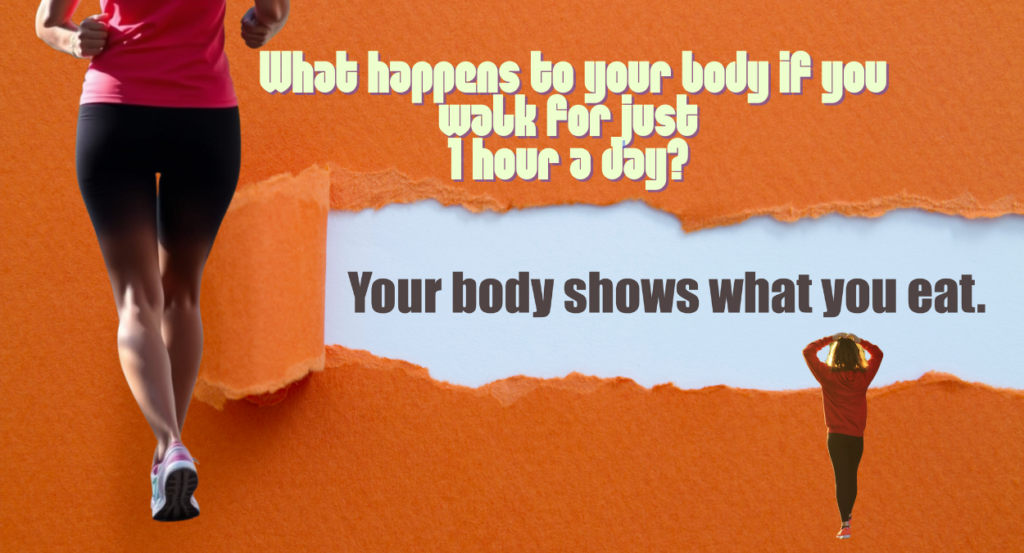What happens to your body if you walk for just 1 hour a day? 10 Incredible Things That Happen to Your Body If You Walk for Just 1 Hour a Day
Discover what happens to your body if you walk for just 1 hour a day—from weight loss to better mood, improved heart health, and reduced disease risk.
What Happens to Your Body If You Walk for Just 1 Hour a Day?
Why Walking Is the Most Underrated Exercise
Walking is one of the simplest, cheapest, and most effective exercises you can do. It doesn’t require a gym membership, fancy gear, or a specific skill. Just one hour of walking daily can bring remarkable changes to your body and mind. But what exactly happens to your body if you walk for just 1 hour a day? Let’s break it down.

Physical Benefits of Walking One Hour Daily
1. Improves Cardiovascular Health
- Strengthens your heart muscles.
- Reduces blood pressure.
- Improves circulation and oxygen flow.
- Cuts down risk of heart disease and stroke.
2. Boosts Muscular Strength and Endurance
- Tones your legs, hips, and core.
- Increases stamina for other activities.
- Builds endurance without putting strain on joints.
3. Helps With Weight Management
- Burns approximately 200–300 calories per hour (depending on pace).
- Supports fat loss when combined with a balanced diet.
- Helps prevent obesity and related health issues.
4. Strengthens Bones and Joints
- Increases bone density and reduces risk of osteoporosis.
- Lubricates joints to prevent stiffness.
- Low-impact exercise suitable for people with arthritis.

Mental Health Benefits of Daily Walking
5. Reduces Stress and Anxiety
- Lowers cortisol (the stress hormone).
- Provides a natural way to clear your mind.
- Helps manage anxiety symptoms.
6. Boosts Mood and Happiness
- Increases endorphins (feel-good hormones).
- Walking outdoors provides exposure to natural sunlight, boosting Vitamin D levels.
7. Enhances Brain Function and Memory
- Improves blood flow to the brain.
- Helps prevent cognitive decline.
- Enhances creativity and focus.

Walking and Long-Term Health
8. Lowers Risk of Chronic Diseases
- Helps prevent Type 2 diabetes.
- Reduces cholesterol levels.
- Lowers chances of certain cancers.
9. Supports Healthy Aging
- Keeps mobility and independence longer.
- Reduces risk of falls and injuries.
- Promotes longevity.
10. Improves Sleep Quality
- Calms the nervous system before bed.
- Helps regulate circadian rhythm.
- Reduces insomnia symptoms.
Lifestyle and Practical Benefits
- Increases Daily Energy Levels – Boosts metabolism and keeps you active.
- Enhances Productivity and Creativity – Walking breaks spark new ideas and problem-solving.
- Easy to Integrate – Can be done anywhere: parks, malls, or even in your neighborhood.
Tips for Getting the Most Out of Your Daily Walk
- Best Time to Walk: Morning walks boost metabolism; evening walks aid digestion.
- Walking Posture: Keep shoulders relaxed, back straight, and swing arms naturally.
- Add Variety: Try brisk walking, incline walking, or listening to music/podcasts to stay motivated.
FAQs: Walking One Hour a Day
1. Is walking one hour every day enough exercise?
Yes! It’s a moderate-intensity workout that meets the World Health Organization’s physical activity recommendations.
2. Can walking one hour a day help with belly fat?
Yes, combined with a healthy diet, walking regularly helps burn visceral fat around the belly.
3. How many steps is one hour of walking?
On average, 1 hour of walking equals 6,000–8,000 steps, depending on your pace.
4. Is it better to walk in the morning or evening?
Both are beneficial. Morning walks energize your day, while evening walks help relax and improve digestion.
5. Can walking reduce the risk of heart disease?
Yes, walking improves heart health, lowers blood pressure, and reduces cholesterol.
6. What happens if I skip a day of walking?
Missing one day won’t hurt, but consistency is key for long-term health benefits.
Conclusion: A Simple Step Toward a Healthier You
Walking for just one hour a day is a powerful way to transform your physical and mental well-being. From stronger muscles and improved heart health to reduced stress and sharper focus, the benefits are endless. It’s proof that small, consistent steps lead to big results.
👉 To learn more about walking’s benefits, check this resource from the Harvard Health Publishing.
https://optimalhealth24.com/top-10-must-know-facts-about-health/






